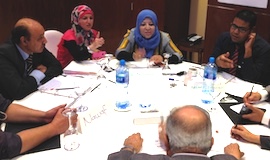Bahrain Education Project Continues With Mentorship Training
Wednesday, April 20, 2016
WDI faculty affiliate Matt Brown is scheduled to travel to Bahrain in May for the next phase of an entrepreneurship training program started in 2014 and designed by WDI in partnership with the Washington, D.C.-based Center for International Private Enterprise (CIPE) to not only increase the number of entrepreneurs in the country, but also give them the needed support to ensure their success.

CIPE’s work in Bahrain, sponsored by the U.S. State Department’s Middle East Partnership Initiative (MEPI), has focused on the immediate need to improve the capabilities of trainers in the entrepreneurship program, and introduce elements of leadership, critical thinking and analysis, ethics and decision-making into the program’s curriculum.
It will be Brown’s second trip to Bahrain, an island nation in the Persian Gulf. His trip is a follow-up to his previous work there in March on how to mentor entrepreneurs.
WDI’s early work in Bahrain centered on entrepreneurship training. Bahrain had started several entrepreneurship initiatives in recent years unique to the region. However, these initiatives have gaps, including a lack of qualified entrepreneurship trainers to deliver the training programs.
To fill that gap, CIPE – which has worked in Bahrain to promote entrepreneurship – asked WDI to develop an entrepreneurship instructor’s manual and leadership curriculum to strengthen the delivery by trainers of Bahrain’s entrepreneurship initiatives.
The training materials incorporate leadership, critical thinking, active citizenship, ethics, and decision-making techniques into the existing curricula. It is used in the training of Bahrain’s trainers, and subsequently by the trainers in their entrepreneurship education programs. The materials incorporate leading practices applied to the unique Bahraini context, and was informed by input generated by a needs assessment survey and CIPE’s Bahraini stakeholders.
Julie Felker, a WDI faculty affiliate, wrote the leadership curriculum. She traveled to Bahrain in December 2014 to hold a workshop for trainers involved in Bahrain’s entrepreneurship initiatives and education programs to implement the training in conjunction with CIPE. Felker’s workshop included discussions on leading practices that were part of the newly developed materials and was tailored to address the needs of the Bahraini trainers.
In March 2015, Peter Scott, professor of entrepreneurship at the Whitman School of Management at Syracuse University and author of the 20-page entrepreneurial training guide, went to Bahrain. The guide provides skills, “how to” examples, and resources to teach entrepreneurship and make the process experiential, or real, for the student.
Bahrain has a reasonably developed entrepreneurship training ecosystem, Scott said. Several Bahraini universities have faculty dedicated to entrepreneurship, and they are excited and motivated to teach the subject. However, they do not have much considerable academic or practical experience on the subject.
Scott said WDI’s work in entrepreneur mentoring is a good complement to the earlier entrepreneurship training. Teaching entrepreneurship is only a small part of starting companies.
“At the specific entrepreneur level, company founders also need mentorship, funding and coaching advice,” he said.
Scott said the trainers he trained were very interested in learning more about design thinking, a human-centered approach to problem solving.
“Solving a big problem that a given group of people has is really the best way to start a company,” he said. “Even something as common as Facebook was started because the founder was trying to solve a problem he experienced.”
In May, Brown will meet with representatives from Tamkeen, a business incubator in Bahrain tasked with developing the country’s private sector. He will deliver a two-day “train the trainer” workshop for these representatives so they can mentor new and existing Bahraini entrepreneurs.
When Brown traveled to Bahrain in March, he brought along a comprehensive entrepreneur mentoring guide he developed to help Tamkeen officials create a program specifically for Bahrain entrepreneurs.
Entrepreneur mentoring is akin to advising an entrepreneur with the express purpose of elevating the mentee’s experience and success, Brown said.
“Having an entrepreneurship mentor is an essential asset to any developing enterprise,” he said. “Mentors can act as sentinels looking out at the horizon helping to identify potential threats and exploitable opportunities. Mentors can also serve as sanctuaries, a safe harbor where ideas can be openly shared and deeply explored.”
WDI’s entrepreneurship training, mentorship training and capacity-building work in Bahrain is one of the institute’s key focus areas, and builds on one of its areas of strength and expertise.
The Bahrain project builds on WDI’s long track record of providing entrepreneurship education in emerging markets. Working with Goldman Sachs’ 10,000 Women project, WDI designed and delivered 12, six-month entrepreneurship programs at the College of Business and Economics at the University of Rwanda in Kigali. In all, more than 300 women graduated from the program, which included modules on “Introduction to Business Strategies,” “Marketing, Negotiations & Customer Care,” “Operating a Business in Rwanda,” “Budgeting & Management Accounting,” “Financial Management & Loans” and “Developing a Successful Business Plan.”
And in 2004, the MEPI office awarded WDI a grant to provide training for entrepreneurs from throughout Morocco. The training consisted of sessions in marketing, strategy, accounting, finance and exporting. The grant was renewed the following year based on successful delivery. WDI partnered with Moroccan-based Al-Akhawayn University to offer a total of six training programs in Morocco.
